V_Grievance
| V_WebMail
| Alumni
| V_Login
| W_Login
| V_LMS
| Route Map
| Contact
| Vasavi Tech Bite
| Events
| Consultancy Fee
| Online Fee Payments
 |
CST Department came into inception from 2019 onwards with an intake of 60 seats in B.Tech.
| S.No | Name of the Course | Eligibility Criteria | Duration | Intake |
|---|---|---|---|---|
| UG Programmes | ||||
| 1 | B.Tech-Computer Science and Technology | AP EAPCET | 4 Years | 60 |
To evolve as a centre of academic and research excellence in the area of Computer Science and Technology.
To utilize innovative learning methods for academic improvement.
To encourage higher studies and research to meet the futuristic requirements of Computer Science and Technology.
To inculcate Ethics and Human values for developing students with good character.
CST Graduates of this programme will be able to :
1. Adapt to evolving technology.
2. Provide optimal solutions to real time problems.
3. Demonstrate his/her abilities to support service activities with due consideration for Professional and Ethical Values.
Computer Science and Technology Graduates will be able to :
1. Engineering knowledge:Apply the knowledge of Mathematics, Science, Engineering Fundamentals and Concepts of Computer Science and Technology to the solution of complex Engineering problems.[K3]
2. Problem Analysis:Identify, formulate, review research literature, and analyze complex engineering problems reaching substantiated conclusions using first principles of Mathematics, Natural Sciences and Computer Science.[K4]
3. Design/development of solutions: Design solutions for complex engineering problems and design system components or processes that meet the specific needs with appropriate consideration for the public health and safety, and the cultural, societal and environmental considerations.[K5]
4. Conduct investigations of complex problems: Use research-based knowledge and research methods including design of experiments, analysis and interpretation of data, and synthesis of the information to provide valid conclusions.[K5]
5. Modern tool usage: Create, select, and apply appropriate techniques, resources, and modern engineering and IT tools including prediction and modeling to complex Engineering activities with an understanding of the limitations.[K3]
6. The engineer and society: Apply reasoning informed by the contextual knowledge to assess societal, health, safety, legal and cultural issues and the consequent responsibilities relevant to the professional Engineering practice.[K3]
7. Environment and sustainability: Understand the impact of the professional engineering solutions in societal and environmental contexts, and demonstrate the knowledge of,and need for sustainable development.[K3]
8. Ethics: Apply ethical principles and commit to professional ethics and responsibilities and norms of the Engineering practice.[K3]
9. Individual and team work: Function effectively as an individual, and as a member or leader in diverse teams, and in multidisciplinary settings.[K6]
10. Communication: Communicate effectively on complex Engineering activities with the Engineering community and with society at large, such as, being able to comprehend and write effective reports and design documentation, make effective presentations, and give and receive clear instructions.[K2]
11. Project management and finance: Demonstrate knowledge and understanding of the Engineering and Management principles and apply these to one's own work, as a member and leader in a team, to manage projects and in multidisciplinary environments.[K6]
12. Life-long learning: Recognize the need for, and have the preparation and ability to engage in independent and life-long learning in the broadest context of technological change.[K1]
A graduate of the Computer Science and Technology will be able to::
1. PSO1:Use Mathematical Abstractions and Algorithmic Design along with Open Source Programming tools to solve complexities involved in Programming. [K3]
2. PSO2:Use Professional Engineering practices and strategies for development and maintenance of software. [K3]
| S.No. | Name of the Faculty | Qualification | Designation | Profile |
|---|---|---|---|---|
| 1 | Mr. T. Sai Mahesh | M.Tech | Asst. Professor | view |
| 2 | Mr. D. Yatesh Ramkumar | M.Tech | Asst. Professor | view |
| 3 | Mrs. S. Santhi Rupa | M.Tech | Asst. Professor | view |
| 4 | Ms.Ch N.S.Sireesha Lakshmi | M.Tech | Asst. Professor | view |
| 5 | Mr. G. Sankar | M.Tech | Asst. Professor | view |
| 6 | Mr. B. Jayachandran | M.Tech | Asst. Professor | view |
| 7 | Mr. P. Prabhakaran | M.Tech | Asst. Professor | view |
| 8 | Mr. M. Raju | M.Tech | Asst. Professor | view |
| 9 | Mr. U. U. Veerendra | M.Tech | Asst. Professor | view |
| 10 | Ms. V. VenkataLakshmi | M.Tech | Asst. Professor | view |
| 11 | Mr. A. Niranjana Rao | M.Tech | Asst. Professor | view |
| 12 | Mr. Sarabandi Kancharla | M.Tech | Asst. Professor | view |
| 13 | Mrs. Ch. N. P. Latha | M.Tech | Asst. Professor | view |
| 14 | Mr. B. Murali Krishna | M.Tech | Asst. Professor | view |
| S.No. | Name of the Staff | Designation |
|---|---|---|
| 1 | Ms. U.Devi Lakshmi | DEO |
| 2 | Mrs. K. Bhagya Sri | DEO |
| 3 | Mr. D.Srinivasa Rao | Attender |
| 4 | Mr. M.Siva Krishna | Attender |
| 5 | Mrs. A.Sri Karuna Kumari | Attender |
| 6 | Mr. V. Venkateswara Rao | Attender |
| S.No. | Name of the Staff | Designation |
|---|---|---|
| 1 | Mr. K.N. Suresh | System Admin |
| 2 | Ms. BNG Lakshmi Durga | Programmer |
| 3 | Mrs. Y Uma Parvathi | Programmer |
| 4 | Mr. K.V Srinivasa Rao | Hardware Technician |
| 5 | Mr. G.Bhanu Prakash | Hardware Technician |
| 6 | Mr. P.Manikanta Gupta | Lab Assistant |
| 7 | Mr. Md.Arriff | Computer Lab Assistant |
| 8 | Mr. P.Lokesh Reddy | Lab Technician |
| 9 | Ms. M. Naga Harika | Lab Technician |
| 10 | Mr. B. Abaddalu | Lab Technician |
| 11 | Mr. S. Nagaraju | Programmer |
| 12 | Mr. N Lokesh Babu | Lab Assistant |
| S.NO | NAME OF THE BOS MEMBER | DESIGNATION | ORGANIZATION | POSITION IN JOBS |
|---|---|---|---|---|
| 1 | Dr. D Jaya Kumari | Professor & HOD | Dept of CSE,SVEC | Chairperson |
| 2 | Dr. A Krishna Mohan | Professor of CSE | JNTUK,Kakinada | University Nominee |
| 3 | Dr. R.B.V Subramaanyam | Professor of CSE | NITW | Academic Expert |
| 4 | Dr. S Pallam Setty | Professor of CSE | Andhra University | Academic Expert |
| 5 | Mr. SrinivasaRaju Vuppalapati | Senior Consultant | MSR IT Services LLP | Industry Expert |
| 6 | Mr. Eedala Rambabu | Technical Lead | Amadeus Labs India Pvt.Ltd | Alumni CSE Dept |
| 7 | ||||
Class Rooms with ICT Enabled Facilities-View
Master Timetable_A.Y for Sem-II 2024-25-View
Master Timetable_A.Y for Sem-I 2024-25-View
Master Timetable_A.Y for Sem-II 2023-24-View
Master Timetable_A.Y for Sem-I 2023-24-View
Master Timetable_A.Y for Sem-II 2022-23-View
Master Timetable_A.Y for Sem-I 2022-23-View
Master Timetable_A.Y for Sem-II 2021-22-View
Master Timetable_A.Y for Sem-I 2021-22-View
The Department has well equipped labs with latest Configuration. Total 9 Computer Labs for UG, PG and one research lab consisting a total of 677 systems. The various servers in the server room which includes, Oracle 11g Database Server, Intranet Server (TOMCAT), NPTEL Video/Web Server, MAT Lab Server 2012 R2, Red Hat Linux 5.0 Server, Library Automation Server, A-Mail Server, ECAP Server.
The college has high speed internet connectivity throughout the campus through a leased line from BSNL with 1Gbps ,500Mbps from Blueifi. The following Laboratories are available in the department:| S.No | Name of the Lab | Configuration | No.of Systems |
|---|---|---|---|
| 1 | James Gosuling Lab |
Model : Acer Vertion M200 Processor : Intel® Core™ i3-7100 CPU @ 3.90 GHz 4.00GB RAM, 1TB HDD System type : x64 – based Processor Monitor : 18.5” LED Monitor Keyboard : Multimedia Keyboard Mouse : Optical Scroll Mouse |
50 |
| 2 | Model : DELL OPTI PLEX 3070 Processor : Intel® Core™ 2 i3-9100 CPU @ 3.60 GHZ 8.00 GB RAM, 1 TB HDD System type : x64 – based Processor Monitor : 20.5” TFT Monitor Keyboard : Multimedia Keyboard Mouse : Optical Mouse |
22 | |
| 3 | Model : ASUS VIVO AIO V222 GAR_V333GA Processor : Intel® Pentium®Silver J5040 8.00 GB RAM, 256.00 GB SSD System type : x64 – based Processor Monitor : 21.5” TFT Monitor Keyboard : Multimedia Keyboard Mouse : Optical Mouse |
02 |
| S.No | Name of the Lab | Configuration | No.of Systems |
|---|---|---|---|
| 1 | E.F.CODD Lab |
Model : HP Pro Tower 280 G9 PCI Processor : Intel® Core™ i5-12400 CPU @ 2.50 GHz 16.00 GB RAM, 256.00 GB SSD System type : x64 – based Processor Monitor : 19.5” LED Monitor Keyboard : Multimedia Keyboard Mouse : Optical Mouse |
70 |
| 2 | Model : ACER Vertion Desktop Processor : Intel® Core™ i5-7400 CPU @ 3.00 GHz 4.00 GB RAM, 1.00 TB HDD System type : x64 – based Processor Monitor : 19.5” LED Monitor Keyboard : Multimedia Keyboard Mouse : Optical Mouse |
4 |
| S.No | Name of the Lab | Configuration | No.of Systems |
|---|---|---|---|
| 1 | Linus Torvalds Lab |
Model : HP 280PRO G9 Micro Tower Processor : Intel core TM i3-10100 CPU@3.64 GHZ 8.00 GB RAM, 256.00 GB SSD System type : x64 – based Processor Monitor: 19.5" LED Monitor Keyboard: Multimedia Keyboard Mouse: Optical Mouse |
72 |
| 2 | Model : ACER Vertion Desktop Processor : Intel® Core™ i5-7400 CPU @ 3.00 GHz 4.00 GB RAM, 1.00 TB HDD System type : x64 – based Processor Monitor : 19.5” LED Monitor Keyboard : Multimedia Keyboard Mouse : Optical Mouse |
2 |
| S.No | Name of the Lab | Configuration | No.of Systems |
|---|---|---|---|
| 1 | PG CP Lab | Model : Acer Vertion Desktop System Processor :Intel® Core™ 2 i3-8100 CPU @ 2.65 GHZ 8.00 GB RAM, 1.00 TB HDD System type : x64 – based Processor Monitor : 21.5" LED Monitor Keyboard : Multimedia Keyboard Mouse : Optical Mouse |
71 | 2 | Model : Acer Vertion Desktop System Processor :Intel® Core™ i5-7400 CPU @ 3.00 GHz 4.00 GB RAM, 1.00 TB HDD System type : x64 – based Processor Monitor : 19.5" LED Monitor Keyboard : Multimedia Keyboard Mouse : Optical Mouse |
2 |
| S.No | Name of the Lab | Configuration | No.of Systems |
|---|---|---|---|
| 1 | R&D Lab | Model : Acer Vertion Desktop System Processor :Intel® Core™ i5-7400 CPU @ 3.00 GHz 4.00 GB RAM, 1.00 TB HDD System type : x64 – based Processor Monitor : 19.5" LED Monitor Keyboard : Multimedia Keyboard Mouse : Optical Mouse |
05 |
| 2 | Manufacturer/Model : Dell 7D49KQR Processor : Intel® Core™ 2 i5-7400 CPU @ 3.00 GHZ 4.00 GB RAM, 1.00 TB HDD System type : x64-based processor Monitor : 21.5” LED Monitor Keyboard : Multimedia keyboard Mouse : Optical Mouse |
15 |
| S.No | Name of the Lab | Configuration | Usage | No.of Systems |
|---|---|---|---|---|
| 1 | Yellow Lab | Model : DELL OPTI PLEX 3070 Processor : Intel Core i3, 9th Gen 8.00 GB RAM, 1 TB Hard Disk System type : x64 – based Processor Monitor : 20.5” TFT Monitor Keyboard : Multimedia Keyboard Mouse : Optical Scroll Mouse |
Placements and Training | 72 |
| S.No | Name of the Lab | Location | Usage | No.of Systems |
|---|---|---|---|---|
| 1 | Pink Lab | Model : DELL OPTI PLEX 3070 Processor : Intel Core i3, 9th Gen 8.00 GB RAM, 1 TB Hard Disk System type : x64 – based Processor Monitor : 20.5” TFT Monitor Keyboard : Multimedia Keyboard Mouse : Optical Scroll Mouse |
Placements and Training | 72 |
| S.No | Name of the Lab | Location | Usage | No.of Systems |
|---|---|---|---|---|
| 1 | Orange Lab | Model : DELL OPTI PLEX 3070 Processor : Intel Core i3, 9th Gen 8.00 GB RAM, 1 TB Hard Disk System type : x64 – based Processor Monitor : 20.5” TFT Monitor Keyboard : Multimedia Keyboard Mouse : Optical Scroll Mouse |
Placements and Training | 72 |
| S.No | Name of the Lab | Location | Usage | No.of Systems |
|---|---|---|---|---|
| 1 | Green Lab | Model : DELL OPTI PLEX 3070 Processor : Intel Core i3, 9th Gen 8.00 GB RAM, 1 TB Hard Disk System type : x64 – based Processor Monitor : 20.5” TFT Monitor Keyboard : Multimedia Keyboard Mouse : Optical Scroll Mouse |
Placements and Training | 72 |
| S.No | Name of the Lab | Location | Usage | No.of Systems |
|---|---|---|---|---|
| 1 | Brown Lab | Model : DELL OPTI PLEX 3070 Processor : Intel Core i3, 9th Gen 8.00 GB RAM, 1 TB Hard Disk System type : x64 – based Processor Monitor : 20.5” TFT Monitor Keyboard : Multimedia Keyboard Mouse : Optical Scroll Mouse |
Placements and Training | 72 |
Seminar halls with ICT Enabled Facilities -View
Department Library offers a variety of books related to Computer Science and Basic Science subjects . Reference books of various subjects are procured. Various Competitive Books are available to satisfy the thirst of the students. Books are issued to students and staff. Students can access the Library facility according to their convenience any time round-the-clock.
| No. of Titles | No. of Volumes |
|---|---|
| 455 | 684 |
 |
Faculty Incharge Mrs. S. Santhi Rupa, Asst. Professor Phone: 08818-284355 E-mail: santhirupa.cse@srivasaviengg.ac.in |
| A.MOUs with Industries | ||||||||||||||||||||||||||||||||||||||||||||||||||||||||||||||||||||||||||||||||||||||||||||||||||||||||||||||||||||||||||||||||||||||||||||||||||||||||||||||||||||||||||||||||||||||||||||||||||||||||||||||||||||||||||||||||||||||||||||||||||||||||||||||||||||||||||||||||||||||||||||||||||||||||||||||||||||||||||||||||||||||||||||||||||||||||||||||||||||||||||||||||||||||||||||||||||||||||||||||||||||||||||||||||||||||||
|
||||||||||||||||||||||||||||||||||||||||||||||||||||||||||||||||||||||||||||||||||||||||||||||||||||||||||||||||||||||||||||||||||||||||||||||||||||||||||||||||||||||||||||||||||||||||||||||||||||||||||||||||||||||||||||||||||||||||||||||||||||||||||||||||||||||||||||||||||||||||||||||||||||||||||||||||||||||||||||||||||||||||||||||||||||||||||||||||||||||||||||||||||||||||||||||||||||||||||||||||||||||||||||||||||||||||
| 1.Internships | ||||||||||||||||||||||||||||||||||||||||||||||||||||||||||||||||||||||||||||||||||||||||||||||||||||||||||||||||||||||||||||||||||||||||||||||||||||||||||||||||||||||||||||||||||||||||||||||||||||||||||||||||||||||||||||||||||||||||||||||||||||||||||||||||||||||||||||||||||||||||||||||||||||||||||||||||||||||||||||||||||||||||||||||||||||||||||||||||||||||||||||||||||||||||||||||||||||||||||||||||||||||||||||||||||||||||
| 2.Seminars / Workshops for Students | ||||||||||||||||||||||||||||||||||||||||||||||||||||||||||||||||||||||||||||||||||||||||||||||||||||||||||||||||||||||||||||||||||||||||||||||||||||||||||||||||||||||||||||||||||||||||||||||||||||||||||||||||||||||||||||||||||||||||||||||||||||||||||||||||||||||||||||||||||||||||||||||||||||||||||||||||||||||||||||||||||||||||||||||||||||||||||||||||||||||||||||||||||||||||||||||||||||||||||||||||||||||||||||||||||||||||
| 3.Industry Oriented Training | ||||||||||||||||||||||||||||||||||||||||||||||||||||||||||||||||||||||||||||||||||||||||||||||||||||||||||||||||||||||||||||||||||||||||||||||||||||||||||||||||||||||||||||||||||||||||||||||||||||||||||||||||||||||||||||||||||||||||||||||||||||||||||||||||||||||||||||||||||||||||||||||||||||||||||||||||||||||||||||||||||||||||||||||||||||||||||||||||||||||||||||||||||||||||||||||||||||||||||||||||||||||||||||||||||||||||
| 4.Faculty Development Programmes | ||||||||||||||||||||||||||||||||||||||||||||||||||||||||||||||||||||||||||||||||||||||||||||||||||||||||||||||||||||||||||||||||||||||||||||||||||||||||||||||||||||||||||||||||||||||||||||||||||||||||||||||||||||||||||||||||||||||||||||||||||||||||||||||||||||||||||||||||||||||||||||||||||||||||||||||||||||||||||||||||||||||||||||||||||||||||||||||||||||||||||||||||||||||||||||||||||||||||||||||||||||||||||||||||||||||||
| 5.Certification Programmes | ||||||||||||||||||||||||||||||||||||||||||||||||||||||||||||||||||||||||||||||||||||||||||||||||||||||||||||||||||||||||||||||||||||||||||||||||||||||||||||||||||||||||||||||||||||||||||||||||||||||||||||||||||||||||||||||||||||||||||||||||||||||||||||||||||||||||||||||||||||||||||||||||||||||||||||||||||||||||||||||||||||||||||||||||||||||||||||||||||||||||||||||||||||||||||||||||||||||||||||||||||||||||||||||||||||||||
| S.No | Oraganization Name | Duration | ||
|---|---|---|---|---|
| From | To | Document | ||
| 1 | Pennant Technologies Pvt Ltd | 06-11-2024 | Till date | View |
| 2 | Zscaler Academic Alliance Program | 08-12-2023 | Till Date | View |
| 3 | New Leaf Learning Solutions | 01-10-2023 | Till Date | View |
| 4 | NIT ANP | 31-12-2022 | Till Date | View |
| 5 | Alteryx SparkED Partner | 30-12-2022 | Till Date | View |
| 6 | Juniper Networks | 30-11-2022 | Till Date | View |
| 7 | Celonis Academic Alliance | 11-11-2022 | Till Date | View |
| 8 | Palo Alto Networks Cyber Security Academy | 08-11-2022 | Till Date | View |
| 9 | Blue Prism Academia Program | 01-11-2022 | Till Date | View |
| 10 | Eduskills | 31-10-2022 | Till Date | View |
| 11 | Hexaware | 25-04-2020 | Till date | View |
| 12 | APSSDC | 29-03-2019 | Till date | View |
B.Interaction with the Industry |
|||||||||||||||||||
|
|||||||||||||||||||
B.Interaction with the Industry |
|
| 1.Various Programs organized during Academic Year 2021-22-View |
| 2.Various Programs organized during Academic Year 2020-21-View |
1. Workshops/SOC organized during the Academic Year 2024-25 - View More
2. Workshops/SOC organized during the Academic Year 2023-24 - View More
3. Workshops/SOC organized during the Academic Year 2022-23 - View More
4. Workshops/SOC organized during the Academic Year 2021-22 - View More
5. Workshops organized during the Academic Year 2020-21 - View More

|

|
||||||||||||
1
| 2
| | ||||||||||||
| |||||||||||||

|
|
1
| 2
| |
| Batch Year | Roll Number | Name of The Student | CGPA/Aggregate |
|---|---|---|---|
| 2020-24 | 20A81A0658 | V. Rama Devi | 9.42 CGPA |
| 2019-23 | 19A81A0645 | Naga Divya Jyothi. V | 9.12 CGPA |
 |
| SNo | Roll No | Name | Score | Year |
|---|---|---|---|---|
| 1 | 20A81A0626 | K.L.P.V Durga | 328 | 2024 |
| 2 | 20A81A0652 | S. Naga Satya Sri | 215 | 2024 |
 |
| Documents Link | Proofs Link | |
|---|---|---|
| Certifications during the Academic Year 2024-25 | View | View |
| Certifications during the Academic Year 2023-24 | View | View |
| Certifications during the Academic Year 2022-23 | View | View |
| Certifications during the Academic Year 2021-22 | View | View |
| Certifications during the Academic Year 2020-21 | View | View |
| 2020-24 | |||

| |||
| 2019-23 | |||
 Roll No:19A81A0650Name:P. Jahnavi Sri NaiduCompany:IBMPackage:12LPA
Roll No:19A81A0650Name:P. Jahnavi Sri NaiduCompany:IBMPackage:12LPA |
|||
For the sake of encouragement for students, every year college management provides merit scholarships to the students for the Best EAMCET rankers as well as academic toppers.
| S.No | Academic Year | Particulars | No. of Students Benefited | Scholarship Amount |
|---|---|---|---|---|
| 1 | 2024-25 | Academic Toppers | 21 | 22750 |
| 2 | 2023-24 | Academic Toppers | 21 | 30750 |
| 3 | 2022-23 | Academic Toppers | 7 | 7500 |
| 4 | 2021-22 | Academic Toppers | 15 | 16250 |
| 5 | 2020-21 | |||
| Gallery | |||
| 1 | 2 | ||
| 3 | 4 | ||
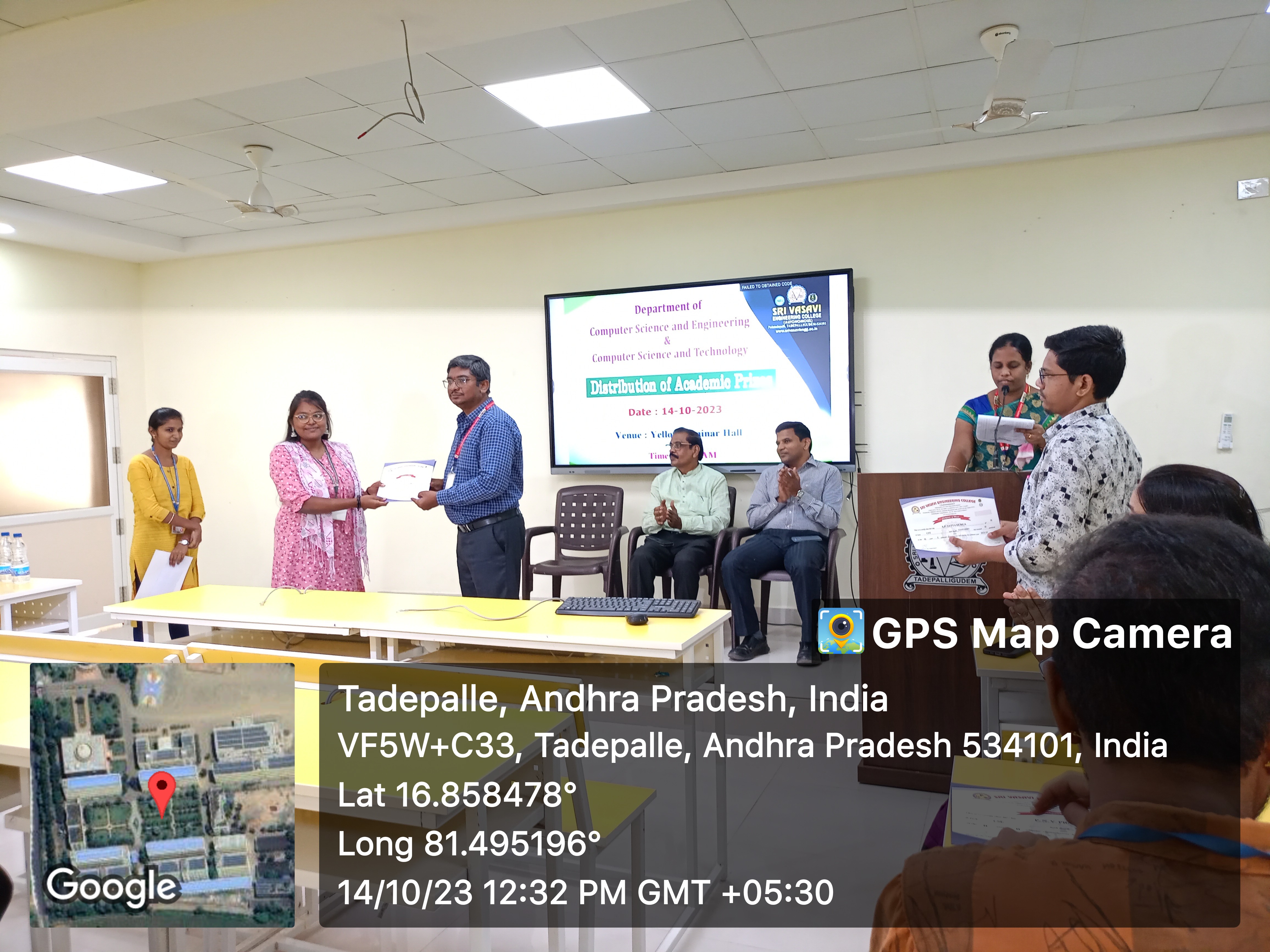 |
 |
||
| 5 | 6 | ||
| 7 | 8 | ||
| 9 | 10 | ||
| 11 | 12 | ||
 |
Department Association- Society of Computers for Ultimate Diligence (SCUD) was started in the year 2002. SCUD team conducts regularly technical fests, workshops and guest lectures for the benefit of students. |
| ENGINEER'S DAY 2K24 | |||
.jpg) |
 |
||
| 1 | 2 | ||
.jpg) |
We come across many heart-rending incidents and pathetic conditions of people in the society everyday. We may not be in a position to give an immediate reaction though we want to.
But the Computer Science and Engineering Students of Sri Vasavi Engineering College extended their hands to help the needy. These helping activities are going on under the name of "SAHAYA" with the slogan 'The Helping Hands' which aptly suits its purpose. SAHAYA is not a one man army rather it is the brainchild of 07 batch students and is being carried on by the subsequent batch students which sounds the real meaning of teamwork.
SAHAYA from its first day was engaged in performing its activities. It was started with the event "CHEYUTHA" in the memory of SVEC Academic Director LATE Dr.B.Janardhan Reddy at ZP High school, Pedatadepalli by providing the fee for needy students and their necessities for study like compass boxes, books etc., and thereafter the journey of helping the needy continued uninterruptedly till date.
Students may have many thoughts in mind but the seeds of thought have sprouted to grow with great confidence by the magnanimous support of the Management.The Management of Sri Vasavi Engineering College always infuses confidence in the students by extending their heartful cooperation.
"SAHAYA" is aptly serving its motto and contributing its little part for the society. A drop may be small but many drops together form ocean. So, one hand may seem weaken but joining the hands together make many changes to step into a brighter world.
| Gallery | |||
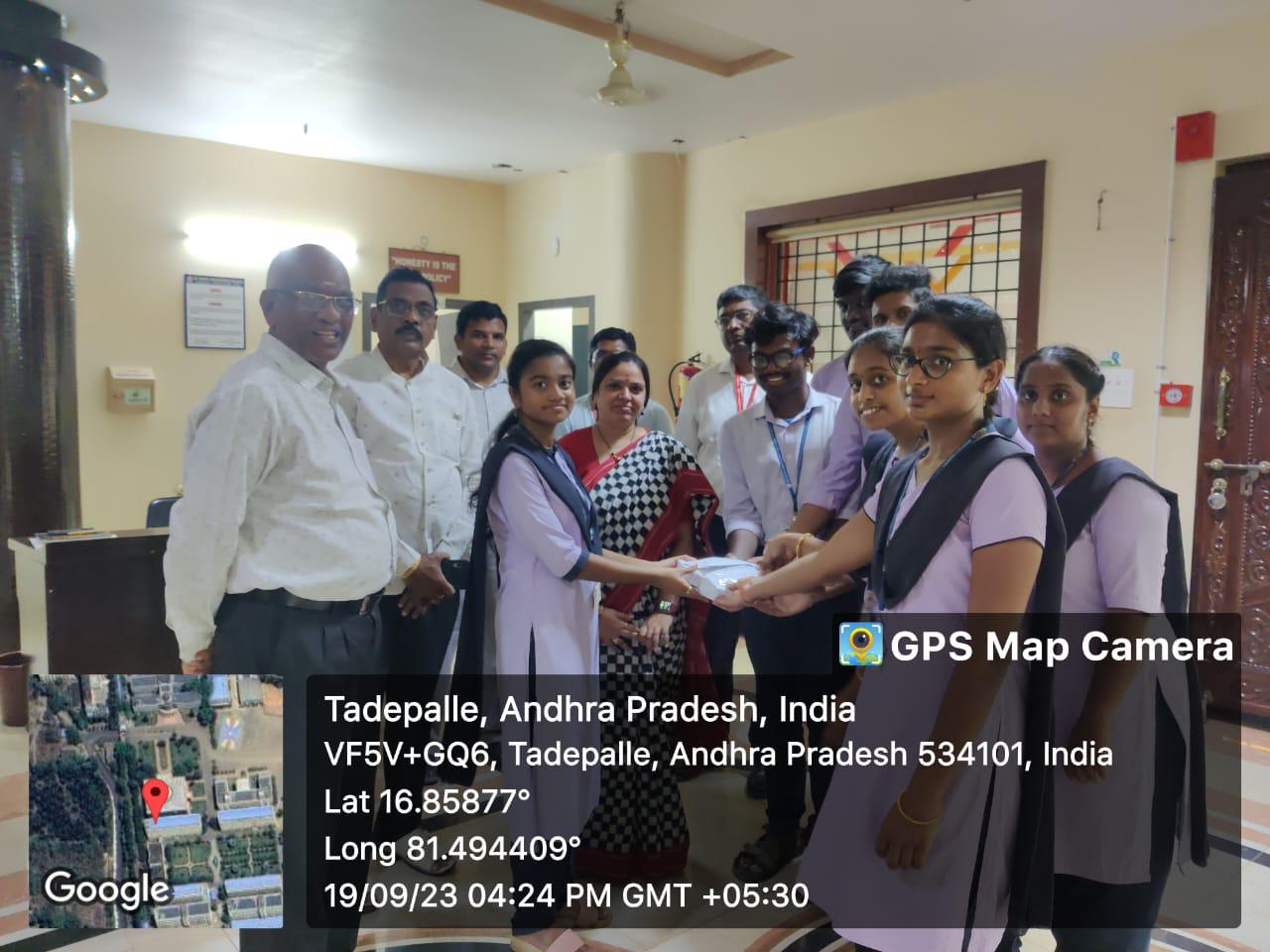 |
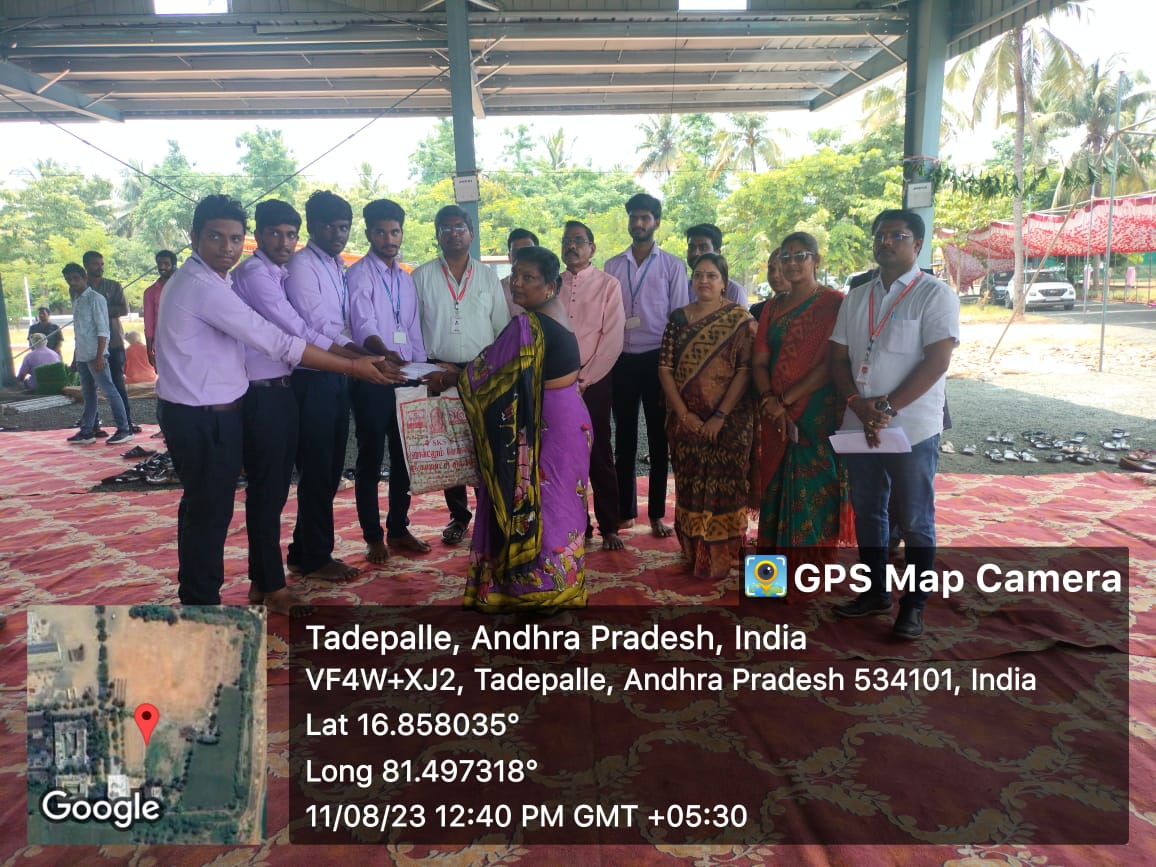 |
||
| 1 | 2 | ||
.jpg) |
|||
| 3 | 4 | ||
| 5 | 6 | ||
.jpg) |
.jpg) |
||
| 7 | 8 | ||
A 24-hour student hackathon is an event where students come together to collaborate, innovate, and create projects within a short time frame. These hackathons have gained immense popularity in recent years, and they hold significant importance for students for several reasons:
1) Hands-on learning: Hackathons provide students with a unique opportunity to engage in hands-on learning. They encourage participants to apply their knowledge and skills to real-world problems and challenges. It allows students to go beyond theoretical knowledge and gain practical experience by working on a project from start to finish within a limited time.
2) Collaboration and teamwork: Hackathons foster collaboration and teamwork among students. Participants usually form teams, bringing together individuals with diverse backgrounds and expertise. Working together, they learn to communicate effectively, leverage each other's strengths, and tackle complex problems collectively. The experience of collaborating with peers from different disciplines helps develop essential teamwork and interpersonal skills.
3) Innovation and creativity: The time constraint of a 24-hour hackathon encourages participants to think innovatively and creatively. Students are often required to come up with novel solutions to problems or create something entirely new within a limited timeframe. This pressure fuels innovation and pushes participants to explore unconventional ideas, leading to the development of unique projects.
4) Networking and industry exposure: Student hackathons often attract participants, mentors, and judges from various industries and organizations. This provides an excellent networking opportunity for students to connect with professionals, potential employers, and like-minded peers. Building connections during a hackathon can lead to future internships, job opportunities, or collaborations on other projects.
5) Skill development: Hackathons offer a platform for students to enhance their existing skills and acquire new ones. During the event, participants may have to learn and use new technologies, programming languages, or tools to complete their projects. This process helps broaden their skillset, exposes them to different technologies, and allows them to experiment with cutting-edge tools and platforms.
6) Resume/portfolio enhancement: Participating in hackathons adds value to a student's resume or portfolio. It demonstrates their passion for learning, problem-solving ability, teamwork skills, and ability to work under pressure. Employers and educational institutions often consider hackathon experience as a strong indicator of a student's practical skills and motivation.
7) Recognition and awards: Many hackathons offer prizes, recognition, or opportunities for participants to showcase their projects to a wider audience. Winning or being recognized in a hackathon can boost a student's confidence, provide validation for their work, and open doors to further opportunities.
In conclusion, 24-hour student hackathons are important because they promote hands-on learning, foster collaboration, encourage innovation, provide networking opportunities, facilitate skill development, enhance resumes/portfolios, and offer recognition for participants. They serve as a platform for students to showcase their abilities, learn from their peers, and gain valuable experience in a short period.
| HACKTHON 2K23 | |||
.jpg) |
.jpg) |
||
| 1 | 2 | ||
Activities of the department towards improvement in teaching-learning are indicated in the office records as well as in college website. They are open for reproduction, for further improvement and for review.
Some of the methods adopted by the faculty members in Teaching & Learning are:
| S.No | Regulation | Sem | Subject | PPT |
|---|---|---|---|---|
| 1 | V23 | III | OOPJ | download |
| 2 | V23 | III | DL&CO | download |
| S.No | Regulation | Sem | Subject | PPT |
|---|---|---|---|---|
| 1 | V20 | I | Problem Solving through C-Programming | download |
| 2 | V20 | III | Data Structures | download |
| 3 | V20 | III | Computer Organization and Architecture | download |
| 4 | V20 | III | OOP's through C++ | download |
| 5 | V20 | III | Managerial Economics and Financial Analysis | download |
| 6 | V20 | III | Mathematical Foundation Of Computer Science | download |
| 7 | V20 | IV | Design Analysis of Algorithms | download |
| 8 | V20 | IV | Java Programming | download |
| 9 | V20 | IV | Software Engineering | download |
| 10 | V20 | IV | Statistical Visualization using R Lab | download |
| 11 | V20 | V | Artificial Intelligence | download |
| 12 | V20 | V | Data Mining | download |
| 13 | V20 | V | Web Technologies | download |
| 14 | V20 | VI | Unified Modeling Language Lab | download |
| S.No | Regulation | Sem | Subject | PPT |
|---|---|---|---|---|
| 1 | V18 | I/II | Programming in C for Problem Solving | download |
| 2 | V18 | III | Obeject Oriented Programming for Problem Solving | download |
| 4 | V18 | III | Digital Electronics | download |
| 5 | V18 | III | Data Mining | download |
| 6 | V18 | IV | Computer Oraganization | download |
| 7 | V18 | IV | Software Engineering | download |
| 8 | V18 | IV | Python Programming | download |
| 9 | V18 | IV | Java Programming | download |
| 10 | V18 | IV | Formal Languages and Automata Theory | download |
| 11 | V18 | V | Database Management Systems | download |
| 12 | V18 | V | Operating Systems | download |
| 13 | V18 | V | Design Analysis of Algorithms | download |
| 14 | V18 | V | Unix Programming | download |
| 15 | V18 | V | Artificial Intelligence | download |
| 16 | V18 | V | Computer Graphics | download |
| 17 | V18 | V | Computer Networks | download |
| 18 | V18 | VI | Data Mining | download |
| 19 | V18 | VI | Object Oriented Analysis and Design | download |
| 20 | V18 | VI | Compiler Design | download |
| 21 | V18 | VI | Cryptography and Network Security | download |
| 22 | V18 | VI | Software Testing Methodologies | download |
| 23 | V18 | VI | Machine Learning | download |
| 24 | V18 | VII | Adavance Java & Web Technologies | download |
| 25 | V18 | VII | SNSW | download |
| 26 | V18 | VII | Distributed Systems | download |
| 27 | V18 | VII | Human-Computer interaction | download |
| 28 | V18 | VIII | Cyber Security | download |
| 29 | V18 | VIII | Software Project Management | download |
Z to A approach on 'Cloud Computing' course for final semester under graduates students based on Journal Paper titled "Cognizance and Ameliorate of Quality of Service using Aggregated Intutionistic Fuzzy C-Means Algorithm, Abettor-based model, Corroboration method and Pandect method in Cloud Computing" is discussed by Y.Divya Vani, CSE Department.-View
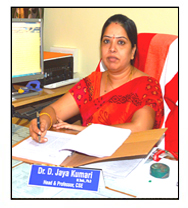 |
